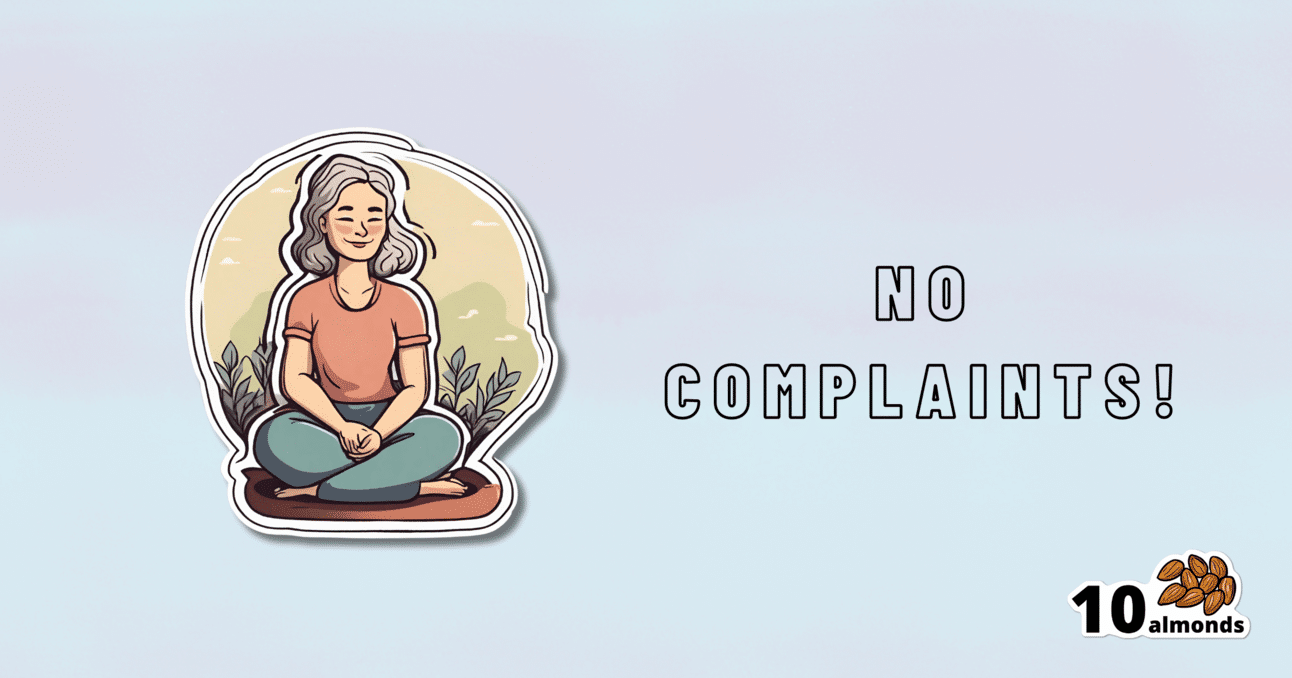When You “Can’t Complain”
Break the complaining cycle for 21 days and boost your happiness. Learn how to communicate effectively and choose your battles wisely.

A Bone To Pick… Up And Then Put Back Where We Found It
In today’s Psychology Sunday feature, we’re going to be flipping the narrative on gratitude, by tackling it from the other end.
We have, by the way, written previously about gratitude, and what mistakes to avoid, in one of our pieces on positive psychology:
How To Get Your Brain On A More Positive Track (Without Toxic Positivity)
“Can’t complain”
Your mission, should you choose to accept it (and come on, who doesn’t like a challenge?) is to go 21 days without complaining (to anyone, including yourself, about anything). If you break your streak, that’s ok, just start again!
Why?
Complaining is (unsurprisingly) inversely correlated with happiness, in a self-perpetuating cycle:
Pet Peeves and Happiness: How Do Happy People Complain?
And if a stronger motivation is required, there’s a considerable inverse correlation between all-cause happiness and all-cause mortality, even when potential confounding factors (e.g., chronic health conditions, socioeconomic status, etc) are controlled for, and especially as we get older:
Investing in Happiness: The Gerontological Perspective
How?
You have already formulated some objections by this point, for example:
- Am I supposed to tell my doctor/therapist “I’m fine thanks; how are you?”
- Some things are worthy of complaint; should I be silent?
But both of these issues (communication, and righteousness) have answers:
On communication:
There is a difference between complaining, and giving the necessary information in answer to a question—or even volunteering such information.
For example, when our site went down yesterday, some of you wrote to us to let us know the links weren’t working. There is a substantive difference (semantic, ontological, and teleological) between:
- ❝The content was great but the links in “you may have missed” did not work.❞ ← a genuine piece of feedback we received (thank you!)
- ❝Wasted my time, couldn’t read your articles! Unsubscribing, and I hope your socks get wet tomorrow!❞ ← nobody said this; our subscribers are lovely (thank you)
- Note that the former wasn’t a complaint, it was genuinely helpful feedback, without which we might not have noticed the problem and fixed it.
- The latter was a complaint, and also (like many complaints) didn’t even address the actual problem usefully.
What makes it a complaint or not is not the information conveyed, but the tone and intention. So for example:
“You’ve only done half the job I asked you to!” → “Thank you for doing the first half of this job, could you please do the other half now?”
Writer’s anecdote: my washing machine needs a part replaced; the part was ordered two weeks ago and I was told it would take a week to arrive. It’s been two weeks, so tomorrow I will not complain, but I will politely ask whether they have any information about the delay, and a new estimated time of arrival. Because you know what? Whatever the delay is, complaining won’t make it arrive last week!
On righteousness:
Indeed, some things are very worthy of complaint. But are you able to effect a solution by complaining? If not, then it’s just hot air. And venting isn’t without its own merits (we touched on the benefits of emotional catharsis recently), but that should be a mindful choice when you choose to do that, not a matter of reactivity.
Complaining is a subset of criticizing, and criticizing can be done without the feeling and intent of complaining. However, it too should definitely be measured and considered, responsive, not reactive. This itself could be the topic for another main feature, but for now, here’s a Psychology Today article that at least explains the distinction in more words than we have room for here:
React vs Respond: What’s the difference?
This, by the way, also goes the same for engaging in social and political discourse. It’s easy to get angry and reactive, but it’s good to take a moment to pick your battles, and by all means fight for what you believe in, and/but also do so responsively rather than reactively.
Not only will your health thank you, but you’re also more likely to “win friends and influence people” and all that!
What gets measured, gets done
Find a way of tracking your streak. There are apps for that, like this one, or you could find a low-tech method you prefer.
Bonus tip: if you do mess up and complain, and you realize as you’re doing it, take a moment to take a breath and correct yourself in the moment.
Take care!
Share This Post
Learn To Grow
Sign up for weekly gardening tips, product reviews and discounts.




